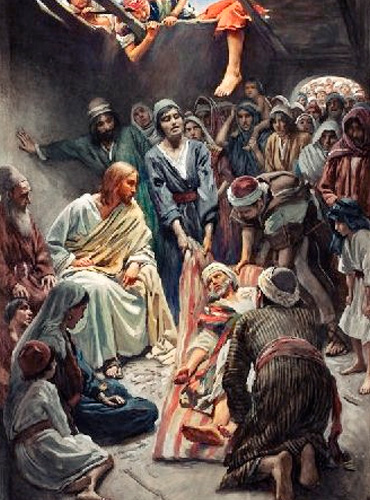Thursday of the Thirteenth Week in Ordinary Time – Option 1 – Mt 9:1-8
Today’s Gospel presents us with the well-known account of Jesus healing a paralytic after he was lowered through the roof. The Gospel passage is well-known, because it occurs in all three Synoptic Gospels (that is, in Matthew, Mark, and Luke). Matthew uses a very surprising sentence to describe what happens: “When Jesus saw their faith, he said to paralytic, ‘Courage, child, your sins are forgiven.’” Our attention is almost instantly focused on the paralytic, but it’s worthwhile to mediate on those mysterious men who brought him to Jesus. Matthew’s Gospel, and indeed the parallel texts in Luke and Mark, are exceedingly vague as to who these figures are. There’s no mention as to their number, their relation to the paralytic, if they were family or friends, or anything. Even the fact that these are men is simply implicit in the verb. Yet, all three Gospels insist that “Jesus saw their faith,” meaning, first of all, that their faith was shown in their deeds. They could have simply given up when they saw the crowds, but they went further to bring the paralytic, whom perhaps they didn’t even know, to Jesus. Their faith wasn’t simply something that they said; in fact, the Gospel doesn’t have them saying anything at all. It was shown in their deeds.
It’s noteworthy too that Jesus saw the faith of those who carried the paralytic, and not the paralytic’s faith. It’s quite likely that the paralytic was not only physically immobile, but also spiritual paralyzed. Perhaps he didn’t even have enough faith to ask Jesus for healing.
This scene is played out many times as we live out our faith as Catholics and particularly as religious: we bring others to Jesus, so that He can heal them. On our own, we are incapable of healing anyone; only Jesus brings about conversion, but we bring these souls, mostly through prayer and penance, to Jesus Christ. We can ask ourselves: are we willing to work for souls, to bring them to Jesus, in spite of the difficulties? Upon seeing the crowds, these men could have simply given up, but instead they went to great lengths to bring a soul to Christ. Are we willing to do that?
Secondly, Jesus doesn’t even acknowledge those men, but He uses a very affectionate word to speak to the paralytic; He calls him τέκνον, which literally means “child” or “son,” but here is meant metaphorically as a particularly affectionate form of address that stems from a bond of love. It’s the one faithless sinner gets all the attention and all the love, and the faithful men get nothing, not even a smile or a pat on the back. This, too, sometimes reminds us our lives. God never lets anything done for love of Him go unrewarded. Surely those men had a reward waiting for them. Although we toil in seeming forgetfulness, God always remembers what we have sacrificed for Him. As Fulton Sheen said, “The cruelest words in Scripture are, ‘Truly I tell you, they already have their reward.’”
Today then, let us pray, through the intercession of Mary, Mother of Mercy, for the grace to always work for the good of souls, even when we can’t see the rewards.






